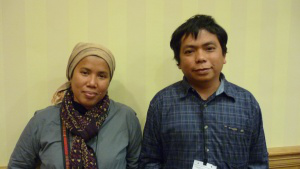Conduct of world's largest mining company under scrutiny

Siti and Kahar
The rescue of the trapped Chilean miners recently captured the imagination of the world. But away from the television cameras, mining operations across the globe are causing untold devastation - destroying whole communities and wrecking the environment - a meeting yesterday at the House of Lords was told. Multinational mining companies working in developing countries or countries with unstable governments have a particularly poor record.
The meeting, chaired by Baroness Sue Miller of Chilthorne Domer and organised by the London Mining Network, was held the day before the world's largest mining company, BHP Billiton, held their AGM in London.
Alternative reports were presented, outlining the damage done by the company's operations in Australia, Colombia, Mozambique, Papua New Guinea and elsewhere. Representatives from the Western Sahara and Indonesia gave dramatic testimonies.
Ken Ritchie, from the Western Sahara Campaign, expressed concern that BHP Billiton has announced its interest in acquiring phosphate mining in the Western Sahara, a territory whose ownership is still in dispute - Morocco invaded it in 1975. Much of the indigenous population, was driven out, under cluster bombs, by the Moroccans, and are living in refugee camps in Algeria. The remaining Saharawis are living as second class citizens in their own country, while Morocco has brought in many thousands of settlers. Sensitive negotiations are taking place to establish some autonomy for the Saharawis. Campaigners say that under international law, Morocco does not have the right to sell their mines. If a deal goes ahead, "BHP Billiton will be the largest private funder of the illegal and brutal occupation of Western Sahara, he said."
Two representatives of indigenous people from the Indonesian island of Borneo urged BHP Billiton to halt its coal mining operations there, which they said: "has destroyed our forests, rivers and livelihoods". Siti Maimunah of JATAM, the Indonesian mining advocacy network, explained that the Kalimantan region is already destroyed by logging and now oil palm and coal are causing further devastation". Her colleague, Kahar, spoke with emotion about how the region is threatened by more than 2,000 mining concessions. "Despite being such big producers of coal, we are amongst the poorest provinces in Indonesia" he said "and we have a problem getting electricity, having power cuts all the time". He hoped BHP Billiton would not be allowed to build a railway across Central Kalimantan because "some of our people have been relocated three times already".
Ian Wood, a representative from BHP Billiton sat in on the meeting. He explained that his company always consulted with communities and said that their code of practice could be found on their website.
London Mining Network is an ecumenical group which identifies the key role of companies listed on the London Stock Exchange, London-based funders and the British Government in promoting destructive mining projects. Members include the Ecumenical Council for Corporate Responsibility and the Missionary Society of St Columban.
LMN co-ordinator Richard Solly, told the meeting that although BHP Billitong is based in Australia and "you may never have heard if it, in fact you may well be financing it and be financed by it, through your bank depostis, your insurance premiums and your pension funds." Investors include Legal and Genral, Barcals, HSBC and Standard Life, he said.
The difficulty is, that decisions about mining are made in boardrooms and government offices, not in the farms, villages, rivers and forests affected by the mines. Siti Maimunah said to Ian Wood: "Please come and visit us. Please come and see what your mines are doing."
Richard Solly asked: "Can communities say an outright 'No' to destruction of their forests, biodiversity and water, in fact to a model of economic development they don't want?"
He felt people should have the right to say 'No' and pointed out that indigenous peoples in particular have rights under the UN Declaration on the Rights of Indigenous Peoples.
He recalled a poster he had seen on the door of a Native American anti-mine campaigner. It said: 'What part of No don't you understand?'
Solly reflected that: "indigenous peoples everywhere are saying 'No' to a so-called model of development which will ultimately destroy all of us unless we stop it."
At the London AGM of BHP Billiton the following day, new company Chair Jac Nasser and Chief Executive Officer Marius Kloppers, took the view that it is for national governments to decide on mineral development. They told Siti Maimunah, who put her complaints directly to the AGM, that the company would not begin opencast mining within protected forests, but it would not be pulling out of Kalimantan.















